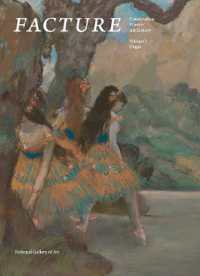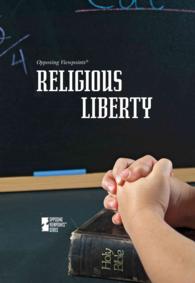- ホーム
- > 洋書
- > 英文書
- > Literary Criticism
Full Description
Tamburlaine the Great, Part One and Part Two are the first plays that Christopher Marlowe wrote for London's then new freestanding, open-air public playhouses. They trace the progress of Tamburlaine, a Central Asian leader, as he "scourge[s] kingdoms with his conquering sword" and rises to imperial power. The plays were a powerful beginning to Marlowe's brief career as a public theatre dramatist: the brutally masculine and martial main character immediately captured audiences, and the plays were widely imitated and parodied. Even four hundred years later, Marlowe's Tamburlaine remains a shocking and seductive figure.
The introduction and historical appendices to this new Broadview Edition provide many avenues for readers to understand these plays, presenting other portrayals of Islam from the period, related lives of Tamburlaine from other writers, and material on Marlowe's scandalous reputation.
Contents
Acknowledgements
Introduction
Christopher Marlowe: A Brief Chronology
A Note on the Text
Tamburlaine the Great, Parts One and Two
Appendix A: Lives of Tamburlaine
1. From George Whetstone, The English Mirror (1586)
2. From John Foxe, Acts and Monuments (1610)
3. From Richard Knolles, The General History of the Turks (1603)
4. Jean Dubec-Crespin, The History of the Great Emperor Tamerlan (1597)
Appendix B: Early Modern English Representations of Islam
1. From George Whetstone, The English Mirror (1586)
2. From Anonymous, Sir Bevis of Hampton (1585)
3. From Giles Fletcher, The Policy of the Turkish Empire (1597)
Appendix C: Literary Intertexts
1. From Robert Greene, Perimedes the Blacksmith (1588)
2. Christopher Marlowe, ""The Passionate Shepherd to His Love,"" in England's Helicon (1600)
3. From Joseph Hall, Virgidemiarum (1597)
4. From Ben Jonson, Timber; or, Discoveries, in The Works of Benjamin Jonson (1641)
5. From Anonymous, The Troublesome Reign of John King of England (1591)
6. From Thomas Dekker, Old Fortunatus (1600)
7. From Thomas Middleton, The Triumphs of Integrity (1623)
8. From Thomas Nashe, Christ's Tears over Jerusalem (1613)
9. From Thomas Dekker, The Wonderful Year (1603)
Appendix D: Marlowe's Reputation
1. From Robert Greene, A Groatsworth of Wit (1592)
2. Thomas Kyd's Two Letters concerning His Arrest and Interrogation Regarding the Dutch Church Libel and Marlowe's Atheism
3. Richard Baines, "A Note Containing the Opinion of Christopher Marlowe concerning His Damnable Judgment of Religion and Scorn of God's Word"
4. From Thomas Beard, The Theatre of God's Judgements (1597)
Select Bibliography








